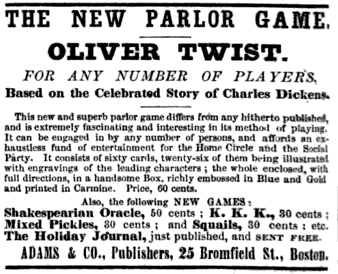|
Aesop's Mission
Aesop's Mission is a spoken-word parlour game involving deduction. It is best played by a group where some of those present are unfamiliar with the game. In the traditional version of the game, a player familiar with the rules takes on the role of Aesop, and secretly chooses a letter of the alphabet. Other players assume the role of a predatory animal of their choice. Aesop then asks each player in turn to name an animal that they have eaten recently; their answer must be creature that their role animal would plausibly be capable of eating. If the named animal contains the letter chosen by Aesop, he denounces them as deserving of punishment and they must perform a forfeit; otherwise they are acquitted as innocent. For example, if Aesop's chosen letter was "O", then a player acting as a lion may safely say they have eaten a sheep, but will be punished if they have eaten a fox. The game continues "for any length of time, or until all have discovered the secret in it". Variants In o ... [...More Info...] [...Related Items...] OR: [Wikipedia] [Google] [Baidu] |
Parlour Game
A parlour or parlor game is a group game played indoors using speech (from French Parler). They were often played in a parlour. These games were extremely popular among the upper and middle classes in the United Kingdom and in the United States during the Victorian era. The Victorian age is sometimes considered the "Golden Age" of the parlour game. During the 19th century, the upper and middle classes had more leisure time than people of previous generations. This led to the creation of a variety of parlour games to allow these gentlemen and ladies to amuse themselves at small parties. Boxed parlour games were very popular from around 1920 until into the 1960s, especially around Christmas. Parlour games competed for attention with the mass media, particularly radio, movies, and television. Though decreased in popularity, parlour games continue to be played. Some remain nearly identical to their Victorian ancestors; others have been transformed into board games such as Balderda ... [...More Info...] [...Related Items...] OR: [Wikipedia] [Google] [Baidu] |
Aesop
Aesop ( or ; , ; c. 620–564 BCE) was a Greek fabulist and storyteller credited with a number of fables now collectively known as ''Aesop's Fables''. Although his existence remains unclear and no writings by him survive, numerous tales credited to him were gathered across the centuries and in many languages in a storytelling tradition that continues to this day. Many of the tales associated with him are characterized by anthropomorphic animal characters. Scattered details of Aesop's life can be found in ancient sources, including Aristotle, Herodotus, and Plutarch. An ancient literary work called ''The Aesop Romance'' tells an episodic, probably highly fictional version of his life, including the traditional description of him as a strikingly ugly slave () who by his cleverness acquires freedom and becomes an adviser to kings and city-states. Older spellings of his name have included ''Esop(e)'' and ''Isope''. Depictions of Aesop in popular culture over the last 2,500 yea ... [...More Info...] [...Related Items...] OR: [Wikipedia] [Google] [Baidu] |
Life (video Games)
In video games, a life is a play-turn that a player character has, defined as the period between start and end of play. Lives refer to a finite number of tries before the game ends with a game over. It is sometimes called a chance, a try, rest or a continue particularly in all-ages games, to avoid the morbid insinuation of losing one's "life". Generally, if the player loses all their health, they lose a life. Losing all lives usually grants the player character "game over", forcing them to either restart or stop playing. The number of lives a player is granted varies per game type. A finite number of lives became a common feature in arcade games and action games during the 1980s, and mechanics such as checkpoints and power-ups made the managing of lives a more strategic experience for players over time. Lives give novice players more chances to learn the mechanics of a video game, while allowing more advanced players to take more risks. History Lives may have originated from t ... [...More Info...] [...Related Items...] OR: [Wikipedia] [Google] [Baidu] |


